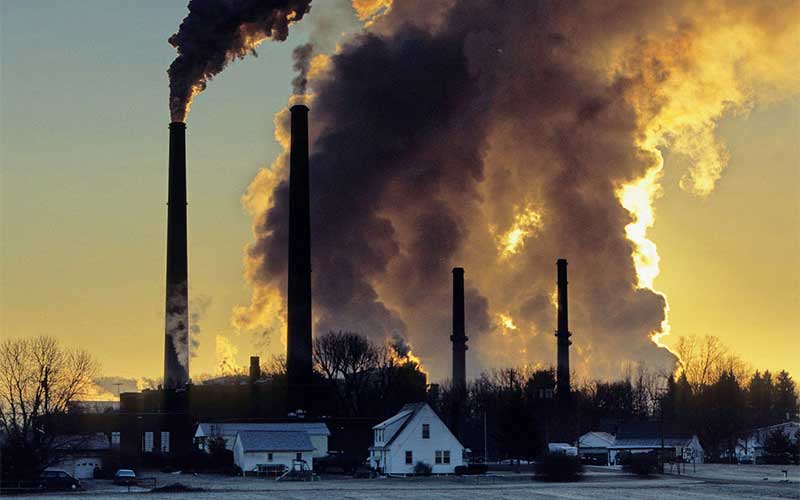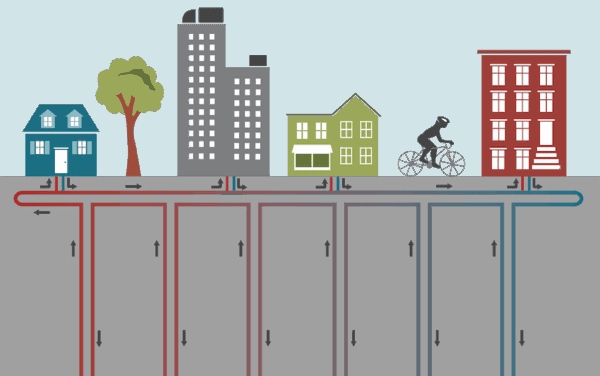
Roughly a third of Massachusetts's emissions are from gas use in buildings. Photo: Lance Erickson via Shutterstock
When it came time to update my home’s heating system from an old oil-burning furnace, I knew gas couldn’t be an option. To solve climate change and improve public health, we need to move away from using dirty fuels like fracked gas to heat and power our homes. So, my husband and I looked into heat pumps as a cleaner way keep our family warm during the winter and cool in the summer. We’re now on our way to getting rid of that old oil tank for good.
My family isn’t alone. In Massachusetts, nearly half of all homes currently rely on gas for heating. And for those of us whose homes still burn oil, like mine did, converting to a natural gas furnace is too often the first and most cost-effective option that comes to mind. All that fracked gas use contributes significantly to the state’s greenhouse gas emissions.
Acknowledging the urgent need to replace this climate-damaging fuel with cleaner alternatives, state leaders are investigating the future of gas and the role of gas utilities in the Commonwealth. But ending our reliance on this dirty fuel could take decades. That’s why the work must start now, especially for Massachusetts to meet its 2050 targets for cutting its overall carbon emissions.
In our new report, we lay out how Massachusetts can move away from dirty gas for home heating and towards a clean future. We also offer a framework for other New England states to start kicking gas to the curb.
Getting Off Gas Requires Incentives for Widespread Heat Pump Adoption
Ultimately, residential heating needs in Massachusetts can be met by transitioning from oil and gas furnaces to heat pumps, as my family did. They’re both cost-effective and provide a lower-carbon form of home heating.
Making this transition on a large scale will require practical policy solutions to cut emissions and create incentives to transform how we heat our homes, including:
- Requiring gas utilities to explore new business models so they no longer rely on building new polluting infrastructure for revenue. Until we change this model, gas utilities have little incentive to change.
- Prioritizing low-income, rental, and other residents in the transition to cleaner options such as heat pumps. Ensuring everyone can afford to make the switch will lead to significant emissions reductions, plus cost savings for families.
- Expanding all rebate programs for air source heat pumps and ending rebates for gas upgrades to jumpstart the transition to clean technology. Cost will always motivate homeowners and landlords – until we stop making gas furnaces an attractive option, we risk remaining reliant on this dirty fuel.
- Revising building codes and establishing carbon footprint standards for residential buildings to lower their emissions – both when new homes are being built and existing homes are up for sale.
- Maintaining a high priority on replacing leak-prone gas pipes that contribute to the state’s overall emissions. This will both lower emissions and improve public health and safety – and save money for those of us paying for that lost gas through our heating bills.
- Ensure gas utilities don’t build pipelines that become obsolete while customers are still paying for them. As the state moves to meet its climate goals, gas utilities will need to take certain pipelines out of service. Customers pay for these infrastructure projects over the course of decades – and shouldn’t be stuck footing the bill for unnecessary pipes.
Reaching Our Clean Energy Future Requires Decisive Action
Implementing these policy solutions over the next 10 years is an efficient, economical way to reduce Massachusetts’s greenhouse gas emissions, meet the needs of local utilities, and improve the lives of residents. With the right policies in place, utilities can replace polluting, dangerous infrastructure with cleaner, safer options. They will also be incentivized to invest in cleaner sources of energy, rather than more fossil fuel infrastructure that will become obsolete before we have even finished paying for its construction.
But these are just the start, for Massachusetts and the rest of New England. More research on utility needs and customer incentive programs will ensure programs are designed and targeted effectively. And this type of analysis must be replicated for other states.
Nearly every New England state has targets for reducing climate-damaging emissions. Meeting these goals will require transitioning away from gas for home heating. Heat pumps like the ones my family installed can and should be the norm when replacing old oil and gas furnaces. It can be done – but will take smart analysis, decisive planning, and targeted action to get there.



